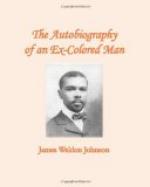This tremendous flow of serious talk from a man I was accustomed to see either gay or taciturn so surprised and overwhelmed me that I could not frame a reply. He left me thinking over what he had said. Whatever was the soundness of his logic or the moral tone of his philosophy, his argument greatly impressed me. I could see, in spite of the absolute selfishness upon which it was based, that there was reason and common sense in it. I began to analyze my own motives, and found that they, too, were very largely mixed with selfishness. Was it more a desire to help those I considered my people, or more a desire to distinguish myself, which was leading me back to the United States? That is a question I have never definitely answered.
For several weeks longer I was in a troubled state of mind. Added to the fact that I was loath to leave my good friend was the weight of the question he had aroused in my mind, whether I was not making a fatal mistake. I suffered more than one sleepless night during that time. Finally, I settled the question on purely selfish grounds, in accordance with my millionaire’s philosophy. I argued that music offered me a better future than anything else I had any knowledge of, and, in opposition to my friend’s opinion, that I should have greater chances of attracting attention as a colored composer than as a white one. But I must own that I also felt stirred by an unselfish desire to voice all the joys and sorrows, the hopes and ambitions, of the American Negro, in classic musical form.
When my mind was fully made up, I told my friend. He asked me when I intended to start. I replied that I would do so at once. He then asked me how much money I had. I told him that I had saved several hundred dollars out of sums he had given me. He gave me a check for five hundred dollars, told me to write to him in care of his Paris bankers if I ever needed his help, wished me good luck, and bade me good-by. All this he did almost coldly; and I often wondered whether he was in a hurry to get rid of what he considered a fool, or whether he was striving to hide deeper feelings.
And so I separated from the man who was, all in all, the best friend I ever had, except my mother, the man who exerted the greatest influence ever brought into my life, except that exerted by my mother. My affection for him was so strong, my recollections of him are so distinct, he was such a peculiar and striking character, that I could easily fill several chapters with reminiscences of him; but for fear of tiring the reader I shall go on with my narration.




